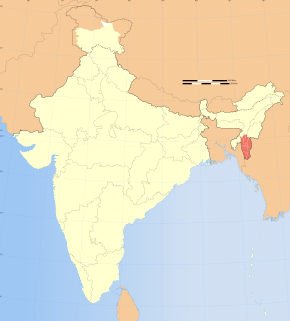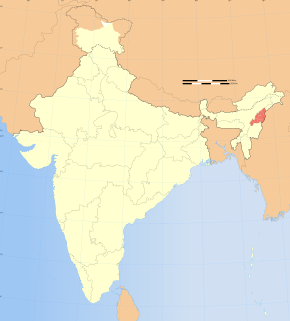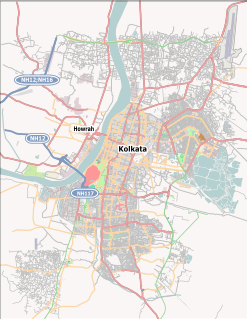The Indian National Lok Dal (INLD) is a political party in India, in the state of Haryana. INLD was founded in October 1996 as Haryana Lok Dal (Rashtriya) by Choudhary Devi Lal, who served as Deputy Prime Minister of India in the V.P. Singh's Cabinet and Chief Minister of Haryana twice. His son Om Prakash Chautala is the president.
India is a federation with a parliamentary system governed under the Constitution of India, which defines the power distribution between the union, or central, government and the states.

Mizoram is the only Lok Sabha constituency in the Northeast Indian state of Mizoram, and covers the entire area of the state. The seat is reserved for Scheduled Tribes. Its first member of parliament (MP) was Sangliana of the Mizo Union who represented this constituency in the Fifth Lok Sabha when it became a union territory on 21 January 1972. In the 1977 election, independent politician, R. Rothuama, was elected and went on to be re-elected in 1980. Shri Lalduhoma of the Indian National Congress (INC) was elected in 1984. Mizoram became a state of India on 20 February 1987. In the next election in 1989, C. Silvera also of the INC was elected. He went on to win the seat in the next two elections, serving from 1989–98 as its MP. Independent candidate H. Lallungmuana was elected in 1998 by a victory margin of only 41 votes. From 1999 to 2009, this constituency was represented for two terms by politician, Vanlalzawma, firstly as an independent candidate and then as a member of the Mizo National Front. As of the 2014 elections, this constituency's MP is C. L. Ruala of the INC who has represented this seat since 2009. The most successful party in this constituency is the INC who have won 6 times out of the elections held.

Nagaland Lok Sabha constituency is the only Lok Sabha in the Northeastern state of Nagaland. It participated in its first general election in 1967 and its first member of parliament (MP) was S. C. Jamir of the Nagaland Nationalist Organisation who was elected unopposed. In 1969, the Twenty-third Amendment of the Constitution of India discontinued the reservation of the seat to Scheduled Tribes. In the 1971 election, A. Kevichusa of the United Front of Nagaland party defeated Jamir. Rano M. Shaiza of the United Democratic Front was elected in the 1977 election.
Puducherry Lok Sabha constituency covers the entire Union Territory of Puducherry. Pondicherry became a union territory after the implementation of the Fourteenth Amendment of the Constitution of India in 1962 and changed its name to Puducherry in 2006. This constituency first held elections in 1967 and its first member of parliament (MP) was Thirumudi N. Sethuraman of the Indian National Congress (INC). Sethuraman represented the Indian National Congress (Organisation) in the 1971 election, which he lost to Mohan Kumaramangalam of the INC. The next election in 1977 was won by Aravinda Bala Pajanor of the All India Anna Dravida Munnetra Kazhagam (AIADMK). P. Shanmugam of the INC won the 1980 election and was re-elected in 1984 and 1989. M. O. H. Farook also of the INC served two terms from 1991 to 1998. In the 1998 election, S. Arumugham of the Dravida Munnetra Kazhagam (DMK) was elected as MP. Farook was re-elected in 1999 to serve a third term as MP. The next election in 2004 was won by M. Ramadass of the Pattali Makkal Katchi (PMK). V. Narayanasamy of the INC was elected in 2009 and was defeated in the next election in 2014 by R. Radhakrishnan of the All India N.R. Congress. Radhakrishnan's victory was the first time that the Lok Sabha seat was won by a member of a Puducherry regional party. As of 2014, Radhakrishnan represents this constituency. The most successful party in this constituency is the Indian National Congress, whose members have won nine out of the thirteen elections held as of 2014.

Lakshadweep Lok Sabha constituency is a Lok Sabha constituency, which covers the entire area of the Union Territory of Lakshadweep in India. This seat is reserved for Scheduled Tribes. As of 2014, it is the smallest Lok Sabha constituency by number of voters.

Thiruthuraipoondi is a municipality in Thiruvarur district in the Indian state of Tamil Nadu. Thiruthuraipoondi is 330 km south of Chennai, 40 km south of Nagapattinam and 65 km east of Thanjavur. As of 2011, the town had a population of 24,404.
General elections were held in India in April–May 1996 to elect the members of the 11th Lok Sabha. The result of the election was a hung parliament, which would see three Prime Ministers in two years and force the country back to the polls in 1998. Atal Bihari Vajpayee of Bharatiya Janta Party, single largest party to win this election, winning 67 more seats than previous 10th Lok Sabha, formed the government which lasted for only 16 days.
Buldhana Lok Sabha constituency is one of the 48 Lok Sabha (parliamentary) constituencies of Maharashtra state in western India. This constituency largely represents Buldhana district in the Lok Sabha of Indian parliament, except Malkapur, which is part of Raver from Jalgaon district of Khandesh region.

The Indian general election of 1957, held from 24 February to 9 June, was the second election to the Lok Sabha, the lower house of the Parliament of India. They were held five years after the first general election, according to the provisions of the Constitution of India. Elections to many state legislatures were held simultaneously.

The Indian general election of 1967 elected the 4th Lok Sabha of India and was held from 17 to 21 February. The 27 Indian states and union territories were represented by 520 single-member constituencies.
Akola Lok Sabha constituency is one of the 48 Lok Sabha (parliamentary) constituencies in Maharashtra state in central India.
Bhandara Lok Sabha constituency was a former Lok Sabha (parliamentary) constituency in Maharashtra state in western India. With the delimitation of the parliamentary constituencies in 2008, based on the recommendations of the Delimitation Commission of India constituted in 2002, this constituency ceased to exist. A new constituency, Bhandara-Gondiya came into existence in place of it.
Gandhinagar Lok Sabha constituency is one of the 26 Lok Sabha constituencies in Gujarat, a state in western India. It first held elections in 1967 and its first member of parliament (MP) was Somchandbhai Solanki of the Indian National Congress (INC). Solanki represented the Indian National Congress (Organisation) party for the next elections in 1971 and was re-elected. In the 1977 election, Purushottam Mavalankar of the Janata Party was elected. Mavalankar was defeated in the next election in 1980 by INC candidate, Amrit Mohanal Patel. G. I. Patel also of the INC was elected in 1984. Since 1989 this constituency has been represented by a member of the Bharatiya Janata Party (BJP). Shankersinh Vaghela won in the 1989 election and the next election saw L. K. Advani elected in 1991. Atal Bihari Vajpayee won this seat in 1996 but chose to resign it so that he could represent Lucknow in Uttar Pradesh. This forced a by-election which was won by Vijay Patel, who defeated film actor Rajesh Khanna (INC), among other candidates. As of 2014 Advani still represented this constituency, having won five consecutive elections since 1998. The most successful party in this constituency is the BJP, whose members had been elected nine times out of the fourteen elections held as of 2014.

Vadodara is one of the 26 Lok Sabha constituencies in Gujarat, a state in Western India. This constituency covers the entire Vadodara district and first held elections in 1957 as Baroda Lok Sabha constituency in erstwhile Bombay State. It has been known as Vadodara since the 2009 elections. Its first member of parliament (MP) was Fatehsinghrao Gaekwad of the Indian National Congress (INC) who was also re-elected in the next elections in 1962. He was the Maharaja of Baroda of the Gaekwad dynasty at the time. P. C. Patel of the Swatantra Party won the election in 1967. From 1971–80, Gaekwad was MP of this constituency again firstly as a member of the Indian National Congress (Organisation) and then as a member of the INC. His younger brother, Ranjitsinh Pratapsinh Gaekwad also of the INC represented the constituency from 1980–89 for two terms before being defeated by Prakash Brahmbhatt of the Janata Dal party in the 1989 election.

Amethi is a Lok Sabha constituency which covers the entire Amethi district and was created in 1967. The seat has almost always been held by the Indian National Congress (INC), save for a half-dozen years in the late 1970s and late 1990s. Rahul Gandhi held the seat for the longest period, from 2004 to present, most recently reelected in 2014, and the seat had also been held by his mother, father, and uncle.
Madhubani Lok Sabha constituency is one of the 40 Lok Sabha (parliamentary) constituencies in Bihar state in eastern India.

Alipore was an assembly constituency in South 24 Parganas district in the Indian state of West Bengal.
Dr. Mono Mohan Das was a Congress politician and a Union Deputy Minister.














